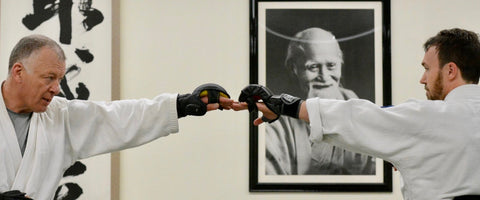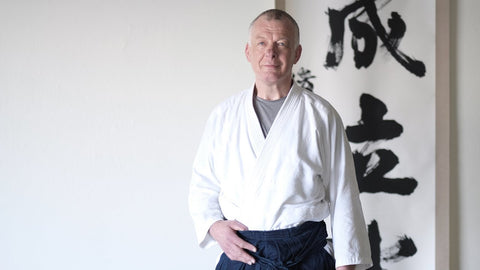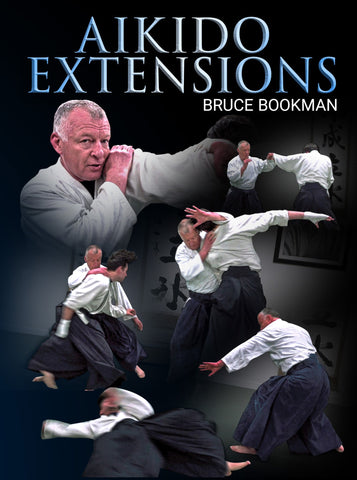Bruce Bookman Sensei has 50 years of aikido experience, nearly 25 years of Brazilian Jiu Jitsu training (ranked as a black belt), and years of boxing experience
- Although Bruce Bookman spends 90% of his time on classical aikido instruction and practice, he is a big believer in self-defense skills and has placed a priority on this at his own dojo and in his own artistic expression as a martial artist
- Although self-defense is not the highest priority for everyone who practices a Budo art, Aikido Journal thinks it’s important to showcase a well-designed, thoughtful approach focused in this area
- Bruce Bookman is truly an innovator in this area
Digital video available for immediate viewing online
Bruce Bookman Sensei has 50 years of aikido experience, nearly 25 years of Brazilian Jiu Jitsu training (ranked as a black belt), and years of boxing experience
- Although Bruce Bookman spends 90% of his time on classical aikido instruction and practice, he is a big believer in self-defense skills and has placed a priority on this at his own dojo and in his own artistic expression as a martial artist
- Although self-defense is not the highest priority for everyone who practices a Budo art, Aikido Journal thinks it’s important to showcase a well-designed, thoughtful approach focused in this area
- Bruce Bookman is truly an innovator in this area
About Aikido Extensions
Aikido Journal is pleased to partner with Effective Self-Defense to share this innovative course with the broader martial arts community. While Aikido and BJJ are different art forms designed for different purposes, they are sister arts - both with their roots in Japanese jiujitsu.
Bruce Bookman Sensei has 50 years of aikido experience, nearly 25 years of Brazilian Jiu Jitsu training (ranked as a black belt), and years of boxing experience. He has studied under many of the greatest first-generation students of the founder of aikido and has built up one of the world’s most successful aikido dojos in Seattle. WA.

Although Bruce Bookman spends 90% of his time on classical aikido instruction and practice, he is a big believer in self-defense skills and has placed a priority on this at his own dojo and in his own artistic expression as a martial artist.
Although self-defense is not the highest priority for everyone who practices a Budo art, Aikido Journal thinks it’s important to showcase a well-designed, thoughtful approach focused in this area for those who do place importance on this facet of the art. There are many others who are active in this area with different approaches. This is only one reference model, but it’s one of the best I’ve seen.
Aside from the practical value of the course material, I find it to be a fascinating technical study. A number of the founder’s first-generation students had deep experience in other martial arts and were able to create new expressions of aikido that were faithful to the art, yet inspired by outside systems. Shoji Nishio did it with karate, sword, and the other arts he studied, Yoshio Kurowia with boxing. Bookman is the first to do so with Brazilian Jiu Jitsu, an art that was virtually inaccessible to the first generation disciples of Morihei Ueshiba. Bruce Bookman began to study BJJ in its early days in the States and was likely the first to teach BJJ classes in Seattle.

Bruce Bookman is truly an innovator in this area and I believe that by the time his work is done, he will hold a place in aikido history that stands side-by-side with the first-generation of legendary aikido pioneers.
This course includes a 90-minute edited video of Aikido Journal’s instructor seminar with Bookman, hosted in May 2018. Watching the seminar will allow you to see his technical approach unfold through a carefully designed progression. The seminar video is supplemented with a series of instructional modules with a dynamic camera that moves to focus on key details. With these, you can quickly pick a technique or concept and explore it in detail. The modules and the seminar video provide distinctly different ways to explore the course material.
Whether or not you end up incorporating any of the course curriculum into your own practice, I believe it will expand your horizons and serve as an inspiring example of a master teacher and technician with a deep love of the art of aikido who has created something truly special.

In addition to my heartfelt gratitude to Bruce Bookman for his friendship and generosity. I’d also like to extend a special thanks to Jonathan Swift and Thomas Segen, Bruce’s students and ukes for this project. Finally, I’d like to thank Roy Dean who filmed, edited, and scored the course video, and Anne Lee for her spectacular photography.
I hope you’ll take the opportunity to look at Aikido Extensions with Bruce Bookman. I believe the quality of instruction and the production values of the end product will set a new benchmark for aikido instructional courses.
Josh Gold
Executive Editor, Aikido Journal




